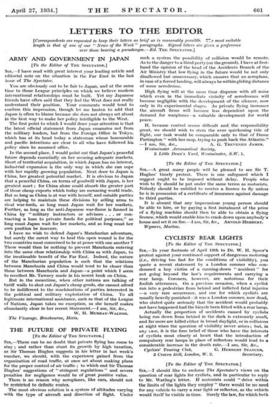THE FUTURE OF PRIVATE FLYING
[To the Editor of THE SPECTATOR.] SIR,—There can be no doubt that private flying has come to stay ; and rather than stunt its growth by high taxation, as Sir Thomas Hughes suggests in his letter in last week's number, we should, with the experience gained from the organization of road traffic, at once set about making plans for the proper control of air traffic ; to which end Sir Thomas Hughes' suggestions of " stringent regulations " and severe penalties for negligence would be of great positive value.
There is no reason why aeroplanes, like cars, should not be restricted to definite routes. -
The most obvious solution is a system of altitudes varying with the type of aircraft and direction of flight. Under
such a system the possibility of collision would be remote. As to the danger to a third party (on the ground), I have at first- hand the opinion of the head of the Accidents Branch of the Air Ministry that low flying in the future would be not only disallowed but unnecessary, which ensures that an aeroplane, in case of a-forced landing, will always be within gliding distance of some aerodrome.
High flying will at the same time dispense with all noise Which even in the immediate vicinity of aerodromes will become negligible with the development of the silencer, now only in its experimental stages. As private flying increases the aircraft firms will become less dependent upon the demand for warplanes—a valuable development for world peace.
If, because control seems difficult and the responsibility great, we should wish to stem the ever quickening tide of flight, our task would be comparable only to that of Dame Partington " with her mop, trying to push back the Atlantic."
2 Little Dean's Yard, Westminster, S.W. 1.












































 Previous page
Previous page